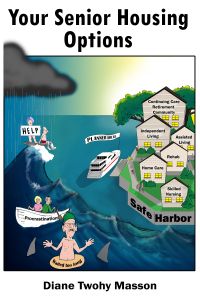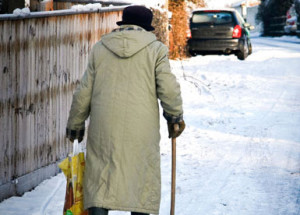
by Diane Masson | Nov 22, 2015
 What should this senior couple do? They sold their home that they could not manage any more and decided to move into an independent rental retirement community in Orange County, California. The couple has an income of $3,600 a month, but their monthly rent is $5,200. (The senior couple’s rent includes three meals a day, wellness classes, entertainment, housekeeping, transportation and etc.) So $1,600 is taken out of their savings for rent on a monthly basis, plus they still have to pay for telephone, Internet, hair styling, car bills, pharmaceuticals, insurances and possibly even gifts and travel.
What should this senior couple do? They sold their home that they could not manage any more and decided to move into an independent rental retirement community in Orange County, California. The couple has an income of $3,600 a month, but their monthly rent is $5,200. (The senior couple’s rent includes three meals a day, wellness classes, entertainment, housekeeping, transportation and etc.) So $1,600 is taken out of their savings for rent on a monthly basis, plus they still have to pay for telephone, Internet, hair styling, car bills, pharmaceuticals, insurances and possibly even gifts and travel.
This senior couple is just one example. Their plight is not uncommon. Thousands of seniors are concerned that their meager savings are eroding too quickly.
What happens when a senior needs assisted living? How will they afford it? What if one of them has a debilitating stroke and needs long-term skilled nursing? On a nationwide basis, it averages $80,000 a year.
Are you aware that board and care homes in Orange County California recently went up $1,000 to $1,500 a month because of the increase to minimum wage? Board and cares are the least expensive options for seniors needing assisted living type care. How will seniors afford the care now?
Social security is not increasing for seniors in 2016.
Costs for independent living, assisted living, memory care and Continuing Care Retirement Communities will continue to rise as food, utilities and minimum wage goes up. Most of these retirement communities are saddled with a 50 to 100 million mortgage. The residents will be making those interest payments too.
Here’s a tip: Ask what the history of the year-over-year monthly fee increases have been. What will it be in 2016? Some predictions are 5 – 8 percent increases? What have you heard?
It is getting tougher for seniors to make decisions and plan for their future.
Here’s another tip: Sometimes that one time investment at a Continuing Care Retirement Community ends up costing you less in the long run. Figure out the break-even point for you. Many offer you support if you outlive your resources. Ask lots of questions and do not rely on verbal promises of senior living sales people.
News Flash: Diane Masson’s new interview on Generation Bold Radio will broadcast on Sunday, December 6th on the BizTalkRadio Network syndicated to 33 stations across the country.
Diane Masson is a senior living expert who has authored two 5-star rated books sold through Amazon. Her new book is an all-encompassing answer guide for seniors called, “Your Senior Housing Options,” designed to help seniors navigate choices quickly. The second book was written for senior living professionals called, Senior Housing Marketing – How To Increase Your Occupancy and Stay Full. Reach out to her through her website: Tips2Seniors.com and read the weekly blog.

by Diane Masson | Nov 15, 2015
 What’s better? What’s the senior housing spin?
What’s better? What’s the senior housing spin?
My mother moved into a not-for-profit Continuing Care Retirement Community. That’s where I started my senior housing career. I sold the not-for-profit status as better and more mission driven than the money grubby for-profits, because that was what all the not-for-profits said and did.
I was naive for three reasons, because later I learned:
- A non-profit board that did not understand seniors or senior housing made financial decisions for the entire senior living community.
- Most of the profits at the non-profit went towards other ministry work instead of being reinvesting back into the senior community.
- A resident was sexual abused by a non-profit staff member, even though every employee professed to be Christian.
Then my senior housing career switched to for-profit. It can be pretty dog-eat-dog aggressive at some companies. It really varies in the senior living industry if the resident is number one or the stockholders are the primary concern. So you better find out before you consider moving there or working there.
If a sales person can’t hit the required sales numbers, you are simply fired at some for-profits. Maybe that’s why so many sales people are impersonal and just want to know if you are ready now? If a senior is not ready now, the sales person has no interest in calling a senior back after they have toured. This is sad, because most seniors need to come back several times before making a decision to move. A relationship needs to be built.
At for-profit senior living communities, most financial decisions go towards the benefit of the stockholders. But there are some amazing administrators that love, adore and would walk on hot coals for their residents and staff. So resident centered communities can vary by location and not the owner in my opinion.
There are actually two types of for-profits: Those on the stock exchange and boutique communities that are run by families or attentive owners. I am lucky to work for a for-profit that is run by attentive owners. They have the heart of a not-for-profit and are completely resident centered and mission driven.
The communities I represent do something very unique for Continuing Care Retirement Communities. They offer a Guarantee of Care for life, if a resident outlives their resources. Every resident has the same offer, it is not limited to 5 or 10 residents on a good Samaritan fund or foundation.
Do you agree with my analogies or am I completely off base? How would you evaluate the differences?
Your Senior Housing Options,” has a simplistic title, but what’s inside this new book can save a you months of research time. Hear Diane Masson’s interview of how her mother and in-law’s faced the pivotal decision to plan ahead or wait until a crisis. Learn the pitfalls from transitioning from your home to senior housing. Understand what questions to ask, insider tips and dirty secrets revealed. For weekly tips join at: Www.Tips2Seniors.com
Diane Masson has worked in senior housing for 17 years and is the regional marketing director for two debt-free Continuing Care Retirement Communities in Southern CA (Freedom Village in Lake Forest and The Village in Hemet). Her first book “Senior Housing Marketing – How to Increase Your Occupancy and Stay Full,” is being utilized by senior housing professionals across the country. Both her first book and second book, “Your Senior Housing Options,” have a 5-star rating on Amazon.com.

by Diane Masson | Oct 18, 2015
 Around 12.9% percent of seniors live in poverty in this nation. They can’t ever enjoy a nice retirement or assisted living community with services! It broke my heart to participate in a health fair at a senior center in Riverside, California a week ago. About a 1000 seniors attended.
Around 12.9% percent of seniors live in poverty in this nation. They can’t ever enjoy a nice retirement or assisted living community with services! It broke my heart to participate in a health fair at a senior center in Riverside, California a week ago. About a 1000 seniors attended.
Most seniors were looking for Section 8 or HUD Housing retirement options. What are these options? It’s renting an apartment based on a percentage of their income or a flat fee. It is simply an apartment building that houses seniors. The senior will most likely not have onsite services and support as they age and dementia begins.
Subsidized senior housing typically does not offer meals, entertainment, wellness classes, transportation to medical appointments or pay for a senior’s cable TV.
It’s disheartening to know that American seniors will be pushed aside to fend for themselves. Why is America trying to save the world and can’t take care of our own seniors? In many states, low-income seniors have no way to afford assisted living. Sure we have Medicaid and Medical when a senior becomes almost completely incapacitated and needs skilled nursing care.
What about that in-between step when a senior needs support either physically, mentally, nutritionally or is lost in dementia? What about that intermediate stage when it has become too difficult to grocery shop or cook for themselves. What about when a senior’s arthritic fingers can’t open a jar or button a blouse? Maybe they can rely on family, friends or neighbors? What if they need help at 7:00 AM or in the middle of the night? What if they don’t ask for help?
I spoke with seniors at the health fair who lived with their adult children. Other seniors had grandchildren depending on them for support. Finally, several seniors had adult daughters caring for them. I asked one frail couple, “What is your plan for your future health care?” They told me that their daughter will take care of them. I asked, “What happens when your care becomes more than your daughter can handle?” (I really wanted to ask if they were willing for their daughter to toilet them at some point.) They were sweetly oblivious to my inquiry and said that she would be able to handle it.
We have a crisis in this country. What can we do about it? Many seniors are living below the national poverty line. They can’t afford to bring in home care, nor can they afford senior housing. Meals-on-Wheels is a wonderful resource, but seniors have to be willing to ask for help.
What are your thoughts on this subject?
Diane Masson is a sought after author, blogger, speaker and regional marketing director. She is very passionate about advocating for seniors on a nationwide basis and educating them about their future choices. She just published a book to help seniors take the guess work out of selecting senior housing options or staying home. It is called, “Your Senior Housing Options.” Her other book has been popular with senior housing professionals on a nationwide basis. It is called, “Senior Housing Marketing – How to Increase Your Occupancy and Stay Full.” You can contact her through her website at tips2seniors.com.

by Diane Masson | Oct 11, 2015
 After 200 blog posts of new content supporting the senior housing industry, why am I suddenly cast aside by LinkedIn? Do you think it is fair? In four years, I have helped tons of LinkedIn users join groups and now the groups shun my blogs?
After 200 blog posts of new content supporting the senior housing industry, why am I suddenly cast aside by LinkedIn? Do you think it is fair? In four years, I have helped tons of LinkedIn users join groups and now the groups shun my blogs?
Why?
LinkedIn and their groups have new rules to stop people from shamelessly promoting themselves. Did LinkedIn protect my quality content when people replied on LinkedIn to my posts with their own self-promotions rather than addressing the question at hand? No!
Why is LinkedIn shunning me now? It’s because I am trying to provide resources to benefit the senior housing industry and seniors through links in my articles.
- One link was to my published book that can benefit seniors and Boomer children in evaluating retirement options. Every human on this planet knows someone who could be helped by learning about, “Your Senior Housing Options.” This is a resource not self-promotion! It took me a year and a half to write it on Saturdays, while I worked full time. I paid my own money to publish this book, because I felt the message would help seniors have a better quality of life by planning ahead.
- Another link was to my YouTube TV interviews. Every video contains an educational resource topic and explains solutions for seniors and family members in crisis mode. One video is about understanding the differences between a senior staying home and paying a caregiver to help take care of them versus moving to assisted living. Another video explains the differences between rental retirement communities and Continuing Care Retirement Communities. How is this self-promotion?
The largest 55 plus community in California thought my information was of value to seniors and published my information and resources on the front page of their publication.
A radio station offered me a 15 minute interview and found the information for seniors to be so helpful that it turned into 30 minutes and another interview is already scheduled.
What is my goal? I want to bring a message to seniors across this nation that they should plan ahead instead of waiting for a crisis. Why? Because I have been working with seniors for 19 years both personally and professionally. My own mother planned ahead at age 75 and my in-laws waited for a crisis. They could not leave their home, so our family has been living in crisis mode for 10 months. My poor mother-in-law with dementia has never been the same since a hospital put her on psychotropic medications during this crisis.
Seniors need to understand the costs and consequences of waiting for a crisis. Every senior has a right to know what their choices are before a health care crisis strikes them.
There will be no links in this article to see if LinkedIn publishes me this week. Please comment if you agree that my links are resources and please comment if you disagree.
Please like this article if you found it of value and pass it on to your friends through social media. If you like what I talk about, then sign up for my weekly newsletter. You may not see me on LinkedIn in the future. Every single one of us knows a senior who has waited too long, so help educate a senior on how to plan ahead today.
Sincerely, Diane Twohy Masson

by Diane Masson | Oct 4, 2015
 First, plan ahead and know that every senior has a 66% chance of needing assisted living or skilled nursing in the future.
First, plan ahead and know that every senior has a 66% chance of needing assisted living or skilled nursing in the future.
Second, do not rely on the verbal promises of senior housing sales people. Read the agreement for services or contract. If a senior does not understand it, they should ask a savvy friend or hire an attorney to help them. The majority of retirement counselors are honest and passionate about serving seniors. A few will say “anything” to get a senior to move in immediately.
How do you know if a retirement community will really take care of you or not in your future? Here are some important questions to ask EVERY senior housing community BEFORE you move from your home:
What happens when a senior needs a higher level of care like assisted living or skilled nursing?
- Will the senior be asked to leave the retirement community?
- Do they offer a higher level of care on the same campus? How much does that cost per month?
- Does an outside company bring caregivers into the senior’s apartment home to provide care? What is the hourly cost? What is that company’s reputation?
What happens if a senior falls in the middle of the night?
- Is there an emergency call system? Who responds to it? Are they medically trained?
- What happens if a senior falls and he or she can’t hit the emergency button? Will they will be found in a timely fashion?
- Is there a daily check in system?
What happens if a senior outlives their resources?
- Will they kick you out? A senior provider kicked out a senior in Houston a week ago.
- Is there a Good Samaritan Fund or Foundation to help a senior so that he or she won’t get kicked out? Is there a limit of how many seniors can be utilizing the fund at any one time?
- Or is there just a flat guarantee of care in writing that a senior will never be kicked out unless they divest their own funds on purpose by giving gifts to their children?
What else should a senior ask in order to make a good move?
These are just some of the intelligent questions that seniors should ask a senior housing provider. Other tips and advice can be found in Diane Masson’s new book, “Your Senior Housing Options.” She has recently been interviewed for TV, radio and newspaper features. Diane Masson has worked in all types of senior housing in her 17-year career. Her first book, “Senior Housing Marketing – How to Increase Your Occupancy and Stay Full,” is being utilized by senior housing professionals around the world.

by Diane Masson | Sep 27, 2015
 Almost everyone wears a mask out in public. It can be exhausting to hide behind a fake exterior and pretend we have it all together. I meet seniors and sales people everyday that seemed poised and polished to the world and yet they are terrified inside.
Almost everyone wears a mask out in public. It can be exhausting to hide behind a fake exterior and pretend we have it all together. I meet seniors and sales people everyday that seemed poised and polished to the world and yet they are terrified inside.
Many seniors and sales people have lost the ability to be real and authentic. They have worked hard to create the illusion that everything is fine, because they fear showing their vulnerability.
Seniors walk into retirement communities everyday announcing that he or she is fine and “not ready yet” to make a move to senior housing. If you could pull off the mask, you might see a frightened senior who knows their memory is slipping, had a recent fender bender in the car or is just extremely lonely. That’s why they are exploring senior housing options.
Is this you?
Sale people may be dealing with an angry teenage daughter, a new baby, or ailing parents. They have to leave their breaking heart in the car and arrive for work with a mask of happiness.
Is this you?
Here are the three most common masks:
The I’m Fine Mask: You smile and say that everything is fine when your heart is breaking. It appears that you have it all, but you may feel lost inside. It is safer to hide, because people expect it.
The Performance Mask: You have the “to do” list. You keep up a frantic pace. If you stop performing then you are not worth anything at all. You want to matter and count.
The “I don’t care” Mask: You don’t bother with your looks. You do not seem to care. You are desperate to not be seen. You are certain that others will reject you.
Masks can be exhausting.
I know because I am usually wearing the performance mask. On top of working full time as a regional marketing director at two Continuing Care Retirement Communities:
My personality has always been driven. I have always increased the occupancy of any senior living community I was working with. I love achieving goals. It’s also important to create balance in my life so I don’t burn out. I just started a women’s bible study called, “Keeping the Balance.” It is already changing my life and helping me recognize the real me, so I can be authentic with you. Today, I had some me time. What a treat. Tonight I will be dancing with my husband at Oktoberfest.
Balance in life is important. The opposite of wearing a mask can be seniors and sales people who over share. They want to dump all their problems on you and it may not be at an appropriate time.
When my mom was in in later stages of dementia, her mask of pretending to be okay was gone. She just said whatever was on her mind.
How about you? What’s your mask? Have you found your balance?
Diane Masson has 19 years experience, both personally and professionally in senior housing. She is an author of two books with 5-star ratings, a weekly blogger and a regional marketing director of two Continuing Care Retirement Communities. Follow her newsletter on Tips2Seniors.com or Tips2Seniors on Facebook.

 What should this senior couple do? They sold their home that they could not manage any more and decided to move into an independent rental retirement community in Orange County, California. The couple has an income of $3,600 a month, but their monthly rent is $5,200. (The senior couple’s rent includes three meals a day, wellness classes, entertainment, housekeeping, transportation and etc.) So $1,600 is taken out of their savings for rent on a monthly basis, plus they still have to pay for telephone, Internet, hair styling, car bills, pharmaceuticals, insurances and possibly even gifts and travel.
What should this senior couple do? They sold their home that they could not manage any more and decided to move into an independent rental retirement community in Orange County, California. The couple has an income of $3,600 a month, but their monthly rent is $5,200. (The senior couple’s rent includes three meals a day, wellness classes, entertainment, housekeeping, transportation and etc.) So $1,600 is taken out of their savings for rent on a monthly basis, plus they still have to pay for telephone, Internet, hair styling, car bills, pharmaceuticals, insurances and possibly even gifts and travel.




